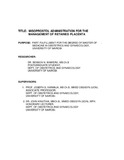| dc.contributor.author | Waweru, Benson N | |
| dc.date.accessioned | 2013-05-25T06:39:11Z | |
| dc.date.available | 2013-05-25T06:39:11Z | |
| dc.date.issued | 2011 | |
| dc.identifier.citation | Master of Medicine in obstetrics and gynaecology | en |
| dc.identifier.uri | http://erepository.uonbi.ac.ke:8080/xmlui/handle/11295/25537 | |
| dc.description.abstract | Background: Postpartum hemorrhage due to retained placenta remains a major
cause of maternal morbidity and mortality in the developing countries. Manual
removal of retained placenta is an element of basic EmOC but currently, only
46% of health facilities offering delivery services in Kenya provide this procedure.
Therefore, an affordable medical solution which is applicable even in the basic
health settings is seriously needed.
Objectives: To describe the effect of sublingual misoprostol in the management
of retained placenta and associated adverse effects.
Methods: This was a cross sectional survey carried out in Pumwani Maternity
Hospital involving 50 mothers with retained placenta, and no PPH, recruited
through consecutive sampling, from Jan to April 2011. Misoprostol, 600mcg
sublingual was administered at enrollment and manual removal was performed if
the placenta was not delivered within 30 minutes. Data was collected using an
interviewer administered structured questionnaire and was analyzed using SPSS
computer package.
Results: 84% of the mothers delivered the placenta within 30 minutes. A further
6% delivered the placenta within the next 10 minutes as they awaited manual
removal. A history of previous uterine surgery negatively impacted on the
outcome. 14% of the mothers reported no side effects, while 60% reported
transient chills. Other reported side effects included nausea (14%), abdominal
cramps (10%) and vomiting (4%).
Conclusion: Sublingual misoprostol 600mcg was effective in reducing the need
for manual removal of placenta and its transient side effects were well tolerated
Recommendations: Misoprostol should be registered and included in the clinical
guidelines for the management of retained placenta. However, further research
preferably a large RCT is recommended. | en |
| dc.language.iso | en | en |
| dc.publisher | University Of Nairobi | en |
| dc.title | Misoprostol administration for the Management of retained placenta | en |
| dc.type | Thesis | en |
| dc.description.department | a
Department of Psychiatry, University of Nairobi, ; bDepartment of Mental Health, School of Medicine,
Moi University, Eldoret, Kenya | |
| local.publisher | College of Health Sciences | en |

